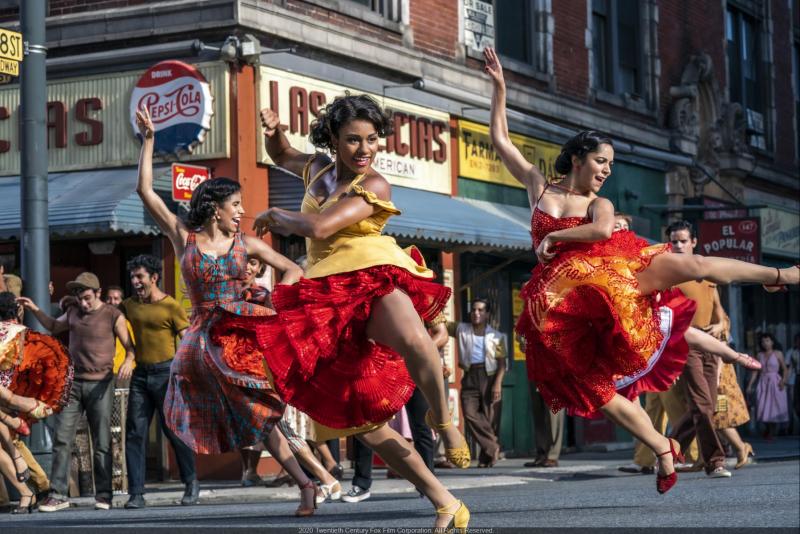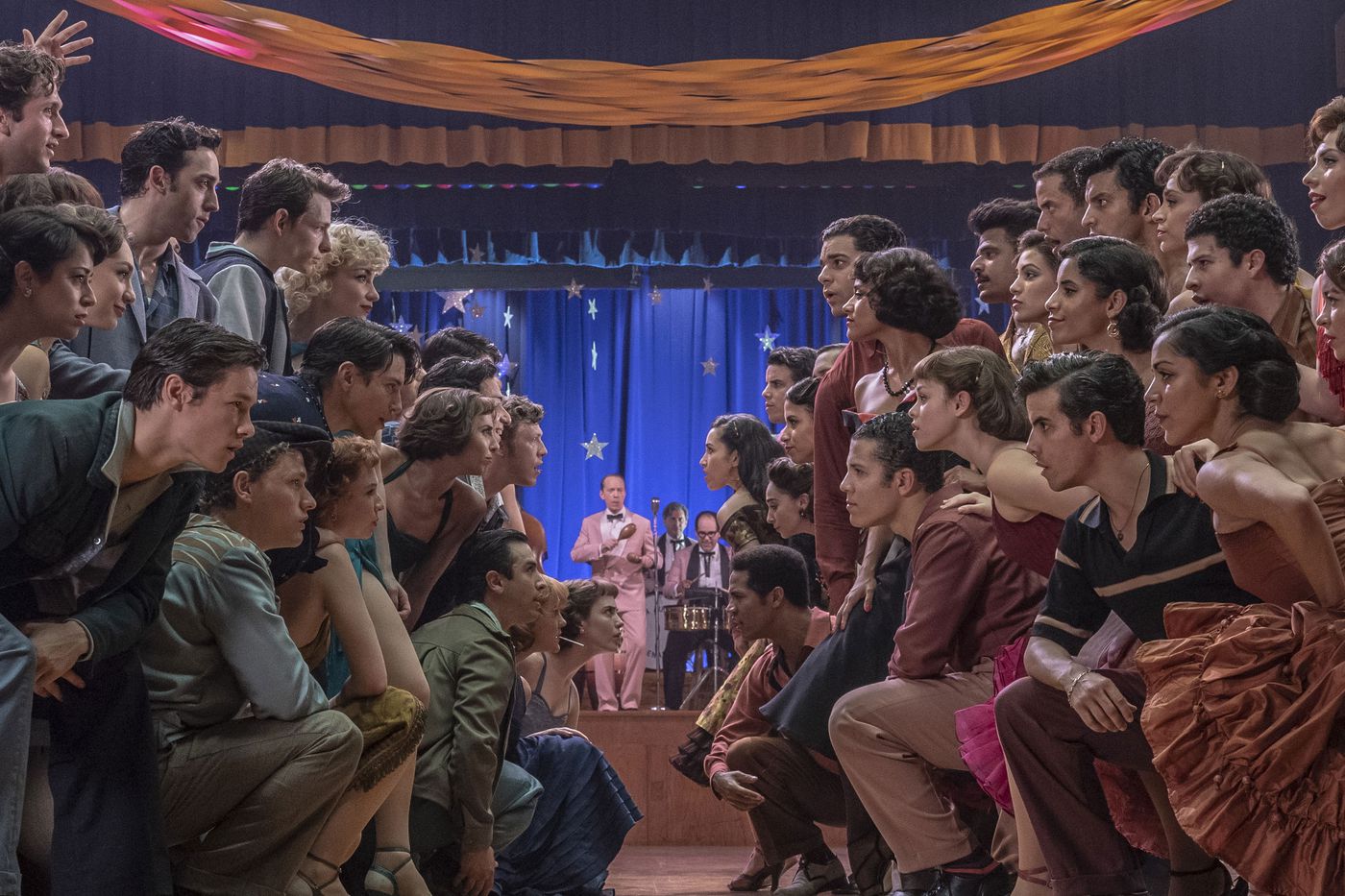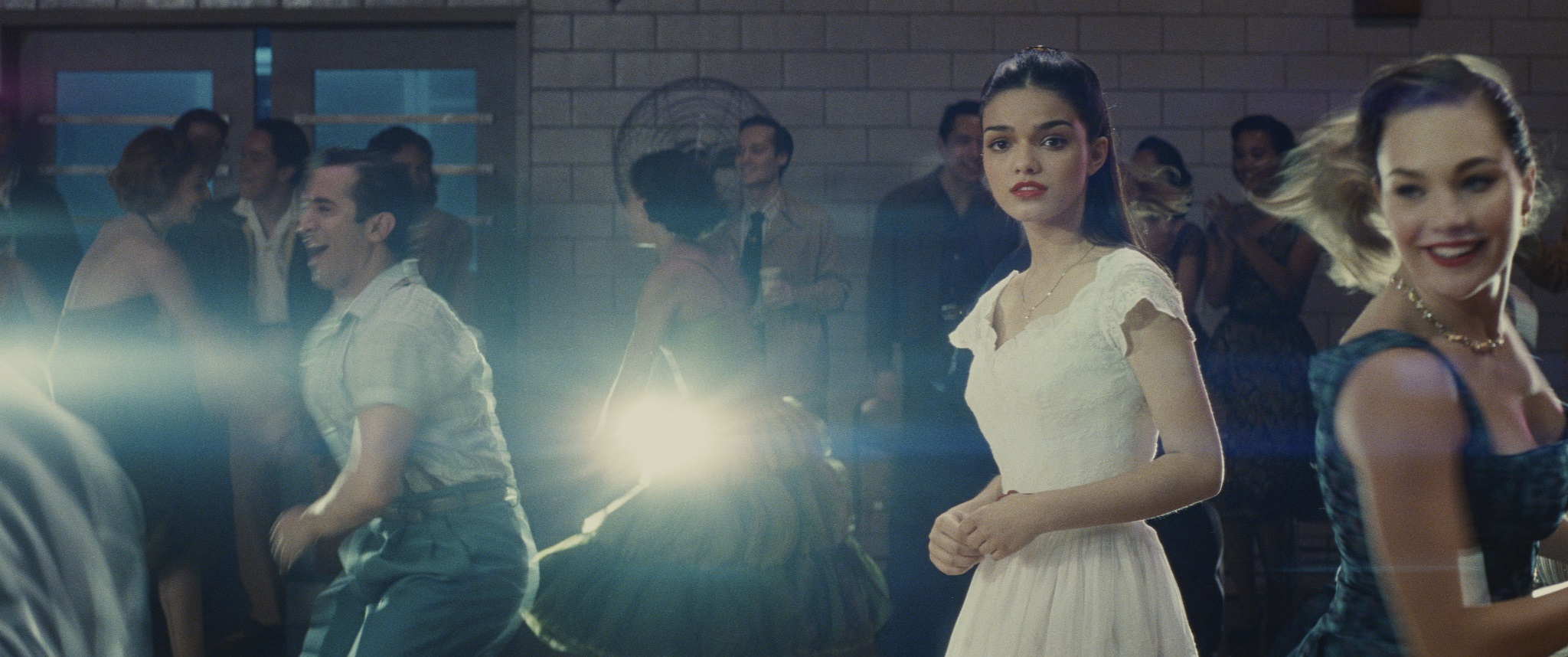DVD/Blu-ray: West Side Story | reviews, news & interviews
DVD/Blu-ray: West Side Story
DVD/Blu-ray: West Side Story
Spielberg’s biggest flop is one of his greatest films

West Side Story’s cinema release crashed into Omicron and never recovered. Maybe Ariana DeBose’s Oscar will help the world wake up to this Spielberg masterpiece, which definitively betters 1961’s Robert Wise/Jerome Robbins version.
Spielberg loves West Side Story as much as its Romeo and Juliet, Tony and María, love each other. The material is part of his childhood, as personal as upcoming semi-memoir The Fabelmans. A film about romantic transcendence that ultimately falls to earth, this is one of his most exuberant and serious works, propelled by Leonard Bernstein’s music, ironised by Stephen Sondheim’s lyrics, and made supernal by dancing.
We begin in a gentrification war zone, aerial shots of the West Side like Berlin in 1945. An eerie, alien whistle signals the emergence of the Jets from beneath the rubble, the waste of the coming gang war over this wasteland now bitterly acute. The Jets are “the last of the Caucasian can’t-make-its” sneers cop Lieutenant Schrank (Corey Stoll). This makes the gang’s appeal more fierce, as they strut and scare together, and the fatalistic humour of leader Riff (Mike Faist) that of a victim. When he buys a pistol from an Irish barman, we glimpse the harsh adult neighborhood that formed him. “Who cares who I am?” Riff asks, choking in the basement dust of demolished buildings. “Nobody, including me. I wake up every day with everything I know either being sold, or wrecked, or being taken over by people I don’t like, and who don’t like me.” Tony Kushner’s script deepens Sondheim’s irony in “Gee Officer Krupke”, when the Jets riotously analyse their own juvenile delinquency.
This West Side Story’s only flaw is Ansel Elgort’s casting as Tony – a founding gang legend and reformed, broken near-killer, like Mickey Rourke in Rumble Fish. Not this pretty, dreamy, gangly kid; though he’s a decent Romeo. Over on the Sharks’ Puerto Rican side of town, pride and self-improvement in the face of racist oppression motivates seamstress Anita (Ariana DeBose), her boyfriend, Sharks prince Bernardo (David Alvarez), and his sister María (Rachel Zegler). This plays out in Anita and Bernardo’s sparring through “America”. This great scene trumps 1961’s set-bound, night-time version under the clear blue heat of New York skies, which melted DeBose’s dancing shoes. Dresses flair and whip like canvas sails, as dancers pour into the streets, expanding unstoppably to fill them, halting traffic, just like the Jets. These are dances as conversations and dreams, elevating the powerless, liberating space with every high kick. As Depression musicals did, they lift you out of yourself, with the sense of wonder that was once a Spielberg cliché. America’s promise, through its music and movies, briefly sweeps all before it.
Over on the Sharks’ Puerto Rican side of town, pride and self-improvement in the face of racist oppression motivates seamstress Anita (Ariana DeBose), her boyfriend, Sharks prince Bernardo (David Alvarez), and his sister María (Rachel Zegler). This plays out in Anita and Bernardo’s sparring through “America”. This great scene trumps 1961’s set-bound, night-time version under the clear blue heat of New York skies, which melted DeBose’s dancing shoes. Dresses flair and whip like canvas sails, as dancers pour into the streets, expanding unstoppably to fill them, halting traffic, just like the Jets. These are dances as conversations and dreams, elevating the powerless, liberating space with every high kick. As Depression musicals did, they lift you out of yourself, with the sense of wonder that was once a Spielberg cliché. America’s promise, through its music and movies, briefly sweeps all before it.
“America” is also a late summit of four 20th century Jewish-American geniuses – Spielberg, Sondheim (who finished his working life with this remake), Bernstein, and creator and original choreographer Jerome Robbins. New choreographer Justin Peck and the exhilarating Latino cast bring their work to golden life. Spielberg is inspired. Other dancers blur past, becoming ghosts, when Tony and María first see each other, turning into the only solid points left in the universe, time stopping as they’re magnetised together, the look of love caught on film. This recalls Jaws’ famous, lurching dolly zoom, as Roy Scheider sickeningly sees a Great White is at work. Bernstein enhances Spielberg’s romantic surges, as Tony and María later flow past the cage-like fire escape separating them, immovable objects liquefied by love and “Tonight”’s duet.
Spielberg is inspired. Other dancers blur past, becoming ghosts, when Tony and María first see each other, turning into the only solid points left in the universe, time stopping as they’re magnetised together, the look of love caught on film. This recalls Jaws’ famous, lurching dolly zoom, as Roy Scheider sickeningly sees a Great White is at work. Bernstein enhances Spielberg’s romantic surges, as Tony and María later flow past the cage-like fire escape separating them, immovable objects liquefied by love and “Tonight”’s duet.
Most changes work. Original Anita Rita Moreno, now 90, turns “Somewhere” into a heart-breaking account of a life, ending with her head bowed, defeated. The reinsertion of Maria’s playful “I’m So Pretty” directly after two stabbings start the Shakespearean death-spiral, as in the 1957 stage production, is one of many daring contrasts, counterpoints and dialogues, beyond Jets and Sharks.
For a film with so much uncompromising social and racial bleakness, this West Side Story spins and roars with life.
Add comment
The future of Arts Journalism
You can stop theartsdesk.com closing!
We urgently need financing to survive. Our fundraising drive has thus far raised £49,000 but we need to reach £100,000 or we will be forced to close. Please contribute here: https://gofund.me/c3f6033d
And if you can forward this information to anyone who might assist, we’d be grateful.

Subscribe to theartsdesk.com
Thank you for continuing to read our work on theartsdesk.com. For unlimited access to every article in its entirety, including our archive of more than 15,000 pieces, we're asking for £5 per month or £40 per year. We feel it's a very good deal, and hope you do too.
To take a subscription now simply click here.
And if you're looking for that extra gift for a friend or family member, why not treat them to a theartsdesk.com gift subscription?
more Film
 The Perfect Neighbor, Netflix review - Florida found-footage documentary is a harrowing watch
Sundance winner chronicles a death that should have been prevented
The Perfect Neighbor, Netflix review - Florida found-footage documentary is a harrowing watch
Sundance winner chronicles a death that should have been prevented
 Blu-ray: Le Quai des Brumes
Love twinkles in the gloom of Marcel Carné’s fogbound French poetic realist classic
Blu-ray: Le Quai des Brumes
Love twinkles in the gloom of Marcel Carné’s fogbound French poetic realist classic
 Frankenstein review - the Prometheus of the charnel house
Guillermo del Toro is fitfully inspired, but often lost in long-held ambitions
Frankenstein review - the Prometheus of the charnel house
Guillermo del Toro is fitfully inspired, but often lost in long-held ambitions
 London Film Festival 2025 - a Korean masterclass in black comedy and a Camus classic effectively realised
New films from Park Chan-wook, Gianfranco Rosi, François Ozon, Ildikó Enyedi and more
London Film Festival 2025 - a Korean masterclass in black comedy and a Camus classic effectively realised
New films from Park Chan-wook, Gianfranco Rosi, François Ozon, Ildikó Enyedi and more
 After the Hunt review - muddled #MeToo provocation
Julia Roberts excels despite misfiring drama
After the Hunt review - muddled #MeToo provocation
Julia Roberts excels despite misfiring drama
 Ballad of a Small Player review - Colin Farrell's all in as a gambler down on his luck
Conclave director Edward Berger swaps the Vatican for Asia's sin city
Ballad of a Small Player review - Colin Farrell's all in as a gambler down on his luck
Conclave director Edward Berger swaps the Vatican for Asia's sin city
 London Film Festival 2025 - Bradley Cooper channels John Bishop, the Boss goes to Nebraska, and a French pandemic
... not to mention Kristen Stewart's directing debut and a punchy prison drama
London Film Festival 2025 - Bradley Cooper channels John Bishop, the Boss goes to Nebraska, and a French pandemic
... not to mention Kristen Stewart's directing debut and a punchy prison drama
 London Film Festival 2025 - from paranoia in Brazil and Iran, to light relief in New York and Tuscany
'Jay Kelly' disappoints, 'It Was Just an Accident' doesn't
London Film Festival 2025 - from paranoia in Brazil and Iran, to light relief in New York and Tuscany
'Jay Kelly' disappoints, 'It Was Just an Accident' doesn't
 Iron Ladies review - working-class heroines of the Miners' Strike
Documentary salutes the staunch women who fought Thatcher's pit closures
Iron Ladies review - working-class heroines of the Miners' Strike
Documentary salutes the staunch women who fought Thatcher's pit closures
 Blu-ray: The Man in the White Suit
Ealing Studios' prescient black comedy, as sharp as ever
Blu-ray: The Man in the White Suit
Ealing Studios' prescient black comedy, as sharp as ever
 The Woman in Cabin 10 review - Scandi noir meets Agatha Christie on a superyacht
Reason goes overboard on a seagoing mystery thriller
The Woman in Cabin 10 review - Scandi noir meets Agatha Christie on a superyacht
Reason goes overboard on a seagoing mystery thriller
 London Film Festival 2025 - crime, punishment, pop stars and shrinks
Daniel Craig investigates, Jodie Foster speaks French and Colin Farrell has a gambling habit
London Film Festival 2025 - crime, punishment, pop stars and shrinks
Daniel Craig investigates, Jodie Foster speaks French and Colin Farrell has a gambling habit

Comments
It's really odd. I appear to